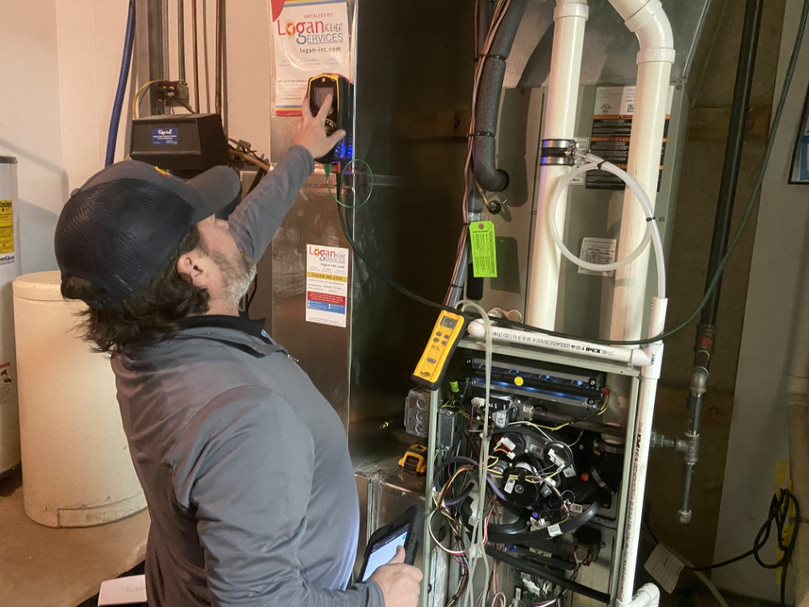Scheduling a furnace tune up with a licensed HVAC specialist is one of the smartest ways to maintain your home’s heating system. A professional furnace tune-up involves a detailed HVAC inspection, cleaning, and adjustment of your furnace to keep it running safely and efficiently, reducing high energy bills.
What is a Furnace Tune-Up?
A furnace tune-up, also known as a furnace service or annual routine furnace maintenance, is a routine appointment where an HVAC specialist will thoroughly evaluate your furnace. To optimize performance, they will check, fix, replace, or clean all the working components.
Some of the key tasks performed during a tune-up may include:
- Cleaning and inspecting the burners, heat exchanger, and blower motor
- Replacing the air filter if needed
- Testing and adjusting airflow and ventilation
- Checking gas pressure and flame quality of the heating system
- Evaluating the ignition system
- Testing safety controls
- Lubricating moving parts
- Checking for gas or carbon monoxide leaks
- Monitoring the condition of blower motor and fan
Technicians use specialized tools and testing equipment to detect issues and ensure everything works correctly. They may make minor repairs or suggest upgrades if problems are identified.
Benefits of a Professional Routine Furnace Maintenance
Getting routine furnace maintenance is highly recommended to keep your unit running efficiently and prevent more costly repairs down the road. Here are some of the major benefits of annual furnace maintenance:
Improves Energy Efficiency
A properly maintained furnace burns fuel much more efficiently than one without routine servicing. When the HVAC specialist checks and adjutstscomponents like the burners, heat exchanger, and blower motor and replaces clogged air filters, it allows proper airflow and optimal combustion within the furnace. This optimization of the furnace’s operation can reduce your monthly gas or heating oil bills over the winter months. Eliminating waste heat and maximizing heat output saves you from high energy bills over time.
Extends Furnace Lifespan
By scheduling regular routine furnace maintenance, minor problems can be identified before they escalate into major repairs or complete component failure. The technician will check the condition of parts like the igniter, flame sensor, and blower motor and recommend replacement if they show signs of wear. Replacing dirty air filters prevents strain on the blower motor as well. Lubricating moving parts reduces friction and wear. Your furnace will last significantly longer and operate better for years with regular annual servicing.
Enhances Safety
A comprehensive furnace tune-up involves checking for potential gas leaks or elevated carbon monoxide levels that pose safety risks if left undetected. If you need a gas furnace tune-up, the HVAC pro will use a gas detector to test for leaks around the heat exchanger, gas line connections, and piping. Proper combustion tuning reduces CO output as well. Malfunctioning components like flame sensors, gas valves, and temperature limit switches will also be tested to ensure the furnace safely shuts off when needed. You can find peace of mind knowing that all safety systems are working properly after a heating system tune-up.
Prevents Unexpected Breakdowns
Because an experienced HVAC technician will thoroughly evaluate your furnace and check functionality, tune-ups allow issues like a failing igniter or blower motor to be identified before they cause complete furnace failure. A faulty component that may go unnoticed by a homeowner can be spotted during routine maintenance before it leaves your family without heat on a freezing day. Preventative furnace maintenance is important because it greatly reduces the chances of being stuck with an expensive emergency repair, especially if you have an older furnace.
Improves Air Quality
Replacing a dirty, clogged furnace filter allows for better airflow and ventilation within your home. The HVAC pro may also remove any accessible debris buildup within the blower and ductwork of your HVAC system. Proper adjustments to the fuel combustion process can reduce carbon monoxide output as well. This contributes to cleaner indoor air quality after your annual heating system tune-up. Better air circulation also improves heating efficiency and can lower energy bills. To learn more about the price of a furnace tune-up, click here.
Provides a Peace of Mind
Knowing your furnace has been thoroughly inspected, cleaned, and tuned by a professional right before the start of winter provides great peace of mind. After the HVAC inspection is complete, the HVAC contractor can explain the overall condition of your furnace, which gives you assurance that your heating system is optimized for efficiency, safety, and reliability during the approaching cold weather months. You can relax knowing your family will stay warm all winter long.
What to Expect During a Furnace Tune-Up
Furnace tune-ups follow a comprehensive checklist to inspect the furnace from top to bottom. While each HVAC pro may have a slightly different process, below are the general steps you could expect:
- Visual HVAC Inspection of Components: Your HVAC pro will open up and visually examine the interior and exterior of the furnace for any obvious signs of wear or damage or notice if your furnace is leaking water.
- Inspect burners and heat exchanger: The burners and heat exchanger will be inspected and the technician may recommend to remove debris and improve combustion efficiency.
- Replace Air Filter: If your furnace filter is dirty, it will be replaced with a new one to improve airflow. Electrostatic filters may be cleaned instead.
- Lubricate Moving Parts: Motors, blowers, and fans will be oiled to reduce friction and noise.
- Evaluate Flame Burn and Pilot Light: The gas pressure, flame color, and pilot light will be checked for proper burning. Adjustments will be made as needed during the HVAC inspection.
- Test Combustion Efficiency: Specialized tools measure airflow, oxygen levels, and exhaust output to optimize the fuel combustion process.
- Check Gas Lines: Gas lines and connections will be inspected for leaks that impact safety and efficiency.
- Test Safety Controls: Limits and cut-off switches will be checked to ensure proper operation if dangerous conditions arise.
- Check Blower Motor and Fan: The blower and fan will be inspected for dirt buildup, noise, and airflow issues.
- Monitor and Test: Your HVAC pro will use instruments to evaluate furnace performance under different operating conditions.
- Review Condition and Make Recommendations: At the end of the heating system tune-up, the HVAC pro should summarize your furnace’s health and suggest any repairs or upgrades.
View our furnace tune up checklist
Tips for Preparing for Your Furnace Inspection
You can make the tune-up process quicker and easier for your HVAC pro by following these tips when scheduling your appointment for your furnace inspection:
- Clear the Area: Remove any stored items or clutter blocking access to the furnace. This allows easy inspection and maintenance.
- Leave Pilot Lights On: If you have a gas furnace, the pilot light should be left on so the HVAC technician can evaluate the flame.
- Replace Your Filter: If your filter is over a few months old, replace it ahead of time to get the most out of your tune-ups.
- Leave Pets Away: Keep pets out of the area so they do not accidentally disturb the furnace or distract the HVAC technician.
- Be Home: You or another adult should be home during the appointment if you have any questions about your heating system.
- Mention Other Issues: Inform your HVAC pro if you’ve noticed your furnace blowing cold air or any unusual sounds, smells, or operations that need checking. Be sure to mention if you have a noticeably high energy bill.
Ask your HVAC company if they are running any tune-up specials or discounts you can use. Scheduling in the off-season also usually saves money.
The Logan Difference
At Logan A/C & Heat, we provide professional furnace tune-ups to keep your system running safely and efficiently through the heating season. Our experienced technicians perform comprehensive assessments and make any necessary adjustments to optimize performance. We take the time to inspect each component, clean your furnace, change filters, and identify potential problems before they lead to breakdowns. Our expertise allows us to spot issues and recommend repairs or replacements so you can make informed decisions about your system.
Our goal is simple – keep your home warm and comfortable during the winter months. We stand behind our work 100% and are committed to your complete satisfaction. You can trust that we will be there for you if any issues come up.
With Logan A/C & Heat, you get personalized care and attention to detail. We explain every step of the process so you feel confident in the work being performed. Invest in preventative maintenance with us, and breathe easier this winter knowing your furnace is in skilled, trustworthy hands. Our professionalism and dedication define the Logan Difference.
Click here to find nearby fall furnace tune-up services
FAQs About Furnace Tune-Ups
How often should I get a furnace tune-up?
Most HVAC pros recommend an annual tune-up before every heating season. Late summer and early fall are the best times of the year to schedule heating maintenance; however, you can still benefit from a furnace tune up later in the winter season. Ask your technician what they suggest based on your furnace’s age, usage, and type. Click here to read our blog about how often to tune up a furnace.
Should I clean my furnace filter myself?
Yes, it’s necessary to check and replace or clean your filter yourself every 30 days in between annual tune-ups. Use the same size and type recommended by your technician. Improper filter replacement can damage your furnace.
How can I tell if my furnace needs a tune-up?
Signs your furnace may need servicing include increased energy bills, loud or grinding noises, furnace blowing cold air, or activation of the safety cut-off switch. Have your furnace inspected if any issues arise before winter. Read our blog on preparing your furnace for winter with a tune up.





















